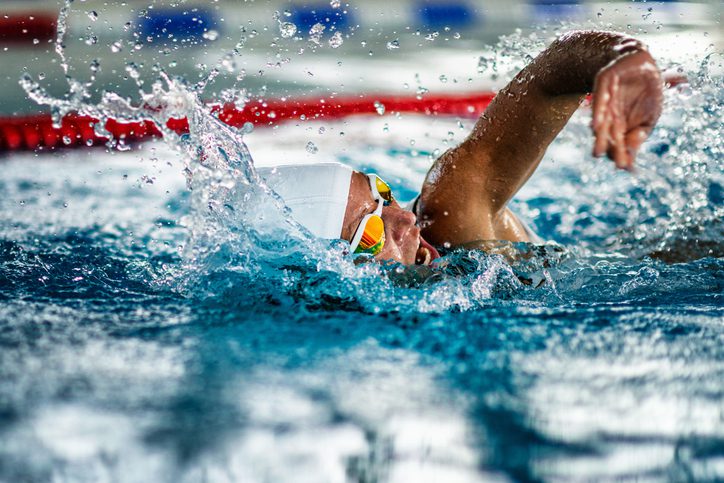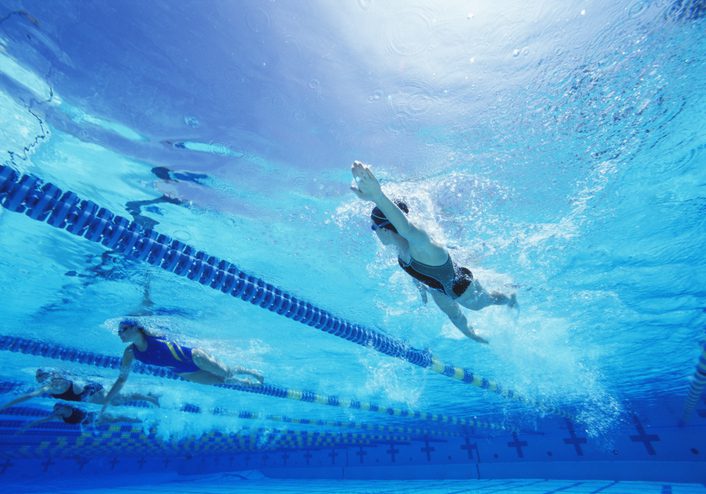Six week stroke improvement program for the fall
Improve your swim times with the right fall swim training program.

I’ve noticed a trend in the sport over the last few decades. Athletes are taking shorter and shorter training breaks. The fear of atrophy has overpowered the wisdom of recovery. The fall should be a bit of a down time for athletes, though. The way to view this period is not to see it as a time of decay but as an opportunity for development – a time to focus on weaknesses. In the pool that usually means working on your technique.
After your last “A” race, and after taking at least ten to twenty days of no structure and limited exercise, think about a six- to eight-week program of aggressive technique improvement. I break it down like this: first we fix the boat, then the propeller, then the transmission. In coaching terms: get flat, grab more water and then increase your stroke rate.
Get flat
If you’re swimming uphill, in other words, your hips are dropping in the water, regardless of the efficiency of your stroke, you won’t be swimming to your full potential.
To help improve your position:
- Increase kick sets from the five- to 10 per cent of your total session that you should be doing in race season to 15 to 25 per cent during the off season. Include a healthy portion of dolphin kick which strengthens the core in a very specific way.
- Increase the use of fins to build strength and ankle flexibility.
- When kicking, focus on lifting your back, kicking from the hips and keeping your kick streamlined, smooth and powerful. Focus on position – not propulsion.
- Engage the core, lift the hips and press the chest down.
- Keep the chin tucked with one goggle in the water at all times. (If you have a problem with this try swimming with a tennis ball tucked under your chin and a swim snorkel.)
To work on your actual stroke, nothing compares to the watchful eye of an experienced coach. If you can pair that with the use of above and below water cameras you’ll be well on your way. Hearing something is good, seeing it is great. I use an iPad mini in a Life Proof case and a selfie stick to video my swimmers. I can give them visual feedback pool side. I also recommend an app called Coach’s Eye which allows me to view the footage one frame at a time, along with a host of other useful features. Another simple but effective way to watch your stroke is to break out your snorkel again.
Tech tips
Band-only swimming is a great way to highlight a weak stroke. By securing the ankles (without a pull buoy) you’ll either sink feet first, or you’ll learn how to catch water and keep yourself going.
The parachute is a gentler way to point out inefficiency. All my swimmers have a child’s beach bucket secured to a punctured tube in their gear bags. It costs a few bucks to make and works perfectly. Imagine driving with the breaks on – as soon as you lift off the gas you slow right down. Swimming with a parachute (or bucket) will highlight the weak spots in your stroke in the same way.
Increase your stroke rate. For this I recommend the use of a tempo trainer, which is a beeping metronome that fits under your swim cap. If you just try to bring up your stroke rate you will likely increase it too aggressively and your stroke will suffer for your efforts. Using a tempo trainer you can determine your natural baseline rate and then attempt to increase it in small increments. Do a test 400, stopping to adjust the unit until you’ve determined a baseline. From there you can start bringing it up in subsequent sessions.
The following might be a typical session my swimmers will do in the off season. I would adjust the volumes based on the level of the athlete.
- 400 choice warm up
- 2 x 200 snorkel w/ fins @ 20″ rest
- 4 x 50 kick as 25 strong/25 easy @ 10″
- 4 x 50 bucket @ 10″
- 400 snorkel w/ tempo trainer set at +5 strokes a minute over baseline. 45” r
- 4 x 50 kick as 25 dolphin/25 free @ 10”
- 4 x 50 band only @ 10”
- 4 x 100 relaxed perfect swimming @ 15”
- 4 x 50 kick w/ fins @ 10”
- 200 Cool Down
The fall off-season is a perfect time to work your swim technique. Remove split times and volume pressure and concentrate on getting good. Getting fast will follow.
Clint Lien is the head coach of Mercury Rising Triathlon based in Victoria and a regular contributor to Triathlon Magazine Canada. Read his swim columns in each issue of the magazine. This story originally appeared in our September, 2016 issue.

